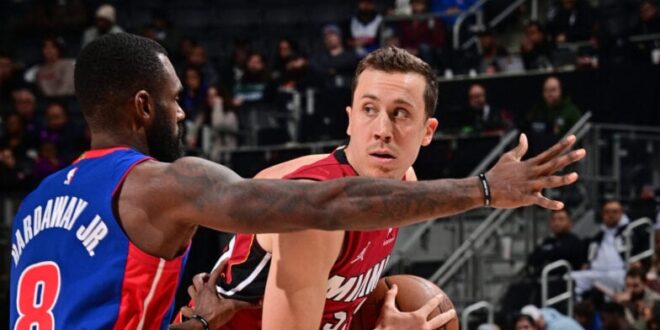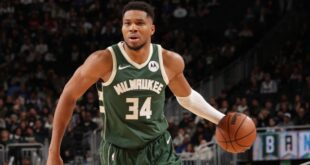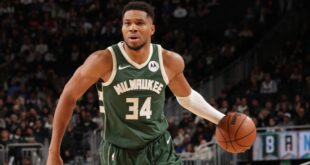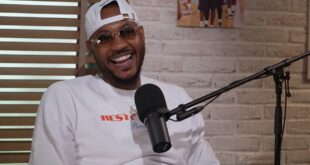**Editor’s Note:** For more coverage of the NBA, visit The Athletic here. The opinions expressed on this page may not align with those of the NBA or its franchises.
* * *
For Duncan Robinson, life has been a delicate balancing act. He recognizes that he deserves the success he has attained, yet the memories of his earlier self, the one who grappled with securing consistent playing time in high school, still linger in his thoughts.
This ongoing struggle, accompanied by anxiety, has helped Robinson forge an eight-year career in the NBA after he went undrafted in 2018, and has propelled him toward achieving his lifelong aspirations.
Anxiety has been a familiar companion for Robinson since his junior year in 2011 at The Governor’s Academy when he experienced fluctuating minutes on his high school basketball team.
He is well-acquainted with uncertainty and the impact of expectations on one’s mental state. While he has celebrated numerous achievements, they have not been sufficient to quell the persistent unease he feels.
In fact, Robinson prefers it that way.
“I’ve always had this anxiety about whether I’m good enough,” he shared with The Athletic. “I have certain God-given talents. … I feel like my unique strength has stemmed from this mindset of ‘I haven’t truly accomplished anything yet.’”
He views this tension as healthy—a beneficial discomfort that drives him away from complacency and towards growth. Now entering his eighth season in the league after going undrafted, he recently signed a three-year, $48 million contract, adding to the more than $70 million he has already accumulated. Nevertheless, he still perceives himself as being only halfway up the metaphorical mountain, with the summit feeling perpetually out of reach.
He finds himself in a constant state of flux—high enough to recognize his capacity for success but distant enough from the pinnacle to foster a sense of insecurity.
Robinson is acutely aware of his limitations. He does not consider himself a physical marvel; his statistics don’t quite match the league’s elite athletes. While he stands at 6-foot-7 and showcases impressive shooting skills, that alone does not bring him comfort.
Robinson thrives on what he describes as living on a “razor’s edge”—a persistent feeling of never having fully arrived.
At 31, he has participated in 423 regular-season games, boasting a 39.7 percent shooting average from three-point range, along with experience in the NBA Finals. Yet he continues to wrestle with self-doubt regarding his worth on the court.
After years of being seen as an underdog, Robinson started a career-high 72 games in the 2020-21 season, solidifying his role within the Miami Heat’s rotation.
His self-perception began to evolve as well.
“The public’s view shifted how I see myself,” he remarked. “The tough part was coming to terms with the understanding that external perceptions shouldn’t dictate how I view myself or the journey I take to become who I aspire to be.
“As much as people may say, ‘Don’t worry about others’ opinions,’ we are all human and we notice our surroundings. So navigating through that—understanding that I’m not defined by being an ‘underdog’ or ‘overpaid’—I define myself by what I do consistently each day.”
What Robinson accomplished during his time in Miami was compelling enough for Detroit’s president of basketball operations, Trajan Langdon, to trade for him.
As the second-oldest player on the roster, behind 33-year-old Tobias Harris, Robinson’s ambition to never settle will be essential on a team with a median age of just 24.6, aiming to advance beyond the first round of the playoffs.
This could yield a fruitful collaboration for Robinson and the Pistons. For Robinson, it represents a chance to expand his leadership presence. For the franchise, his experience is invaluable.
Robinson possesses a deep reservoir of knowledge about the NBA. He knows what it’s like to be sidelined with little playing time, to be tapped as a starter, and to face the disappointment of returning to the bench after having started.
“The most significant moments in my career—those that appear to be the biggest achievements—have often been succeeded by intense setbacks,” Robinson reflected. “That’s a common experience in life. Everyone can relate—it’s not merely about transitioning from highs to lows, but rather how one responds and finds balance to maintain peace and motivation to advance.”
Such equilibrium is vital in Detroit, where he joins a veteran presence alongside Harris, with his former Michigan teammate Caris LeVert also contributing experience as a 30-year-old.
Robinson emphasizes that he has worked on his resilience just as diligently as he has worked on honing his basketball skills.
“Resilience has essentially become a hallmark of who I aspire to be,” he stated. “I genuinely believe that learning to navigate setbacks and challenges is just as crucial a skill as shooting or dribbling. Mastering this skill comes through repetition and experience.”
From an early age, Robinson faced challenges that compelled him to ask himself, “Is this what you truly want?” Each time, he affirmed, “Yes, I love basketball more than anything. It’s what I do, not who I am. However, the game has provided me with more than I could have ever imagined.”
Part of Robinson’s commitment to the game involves sharing his insights, while remaining receptive to learning from others. As the only Piston with NBA Finals experience, he has a unique perspective to offer.
The synergy between Robinson’s journey to the Finals, Harris’ extensive playoff experience, and LeVert’s postseason appearances could prove essential for a young roster.
During his first outing with his new teammates at the Las Vegas Summer League after signing, Robinson expressed that the team’s youth was a key factor in his decision to join. He also noted parallels between his experiences and the environment he is stepping into.
“When I think of Detroit, I think of resilience,” he commented. “It’s a city that has endured both incredible peaks and devastating lows, yet it continues to rebound—much like my own journey in basketball.”
After collaborating with seasoned players such as Dwyane Wade, Jimmy Butler, Udonis Haslem, and Andre Iguodala, Robinson is now embracing a new phase where he will likely be depended upon similarly to how he relied on Wade during his rookie year.
“The games last year were quite eventful,” he reflected with humor. “What stands out about this group is their physicality, tenacity, and the effort they put into playing. Plus, their ability to share the rock is indicative of the kind of system I want to be part of, among teammates with that mindset.”
The Pistons’ commitment to Robinson signifies their confidence in his ability to contribute not only on the court but also within the locker room, reinforcing that he is more than capable. While the inner voice pushing Robinson toward realizing his full potential may never completely quiet, it has now turned into an opportunity for him to impart wisdom to the youngest team he’s ever played for.
“At this point in my career,” he emphasized, “I see it as a privilege to give back to a sport that has given me so much.”
***
Hunter Patterson serves as a staff writer for The Athletic focused on the Detroit Pistons. Before his current role in NBA coverage, he was an editor on The Athletic’s news desk and contributed occasional coverage of the Sacramento Kings. Prior to joining The Athletic, he worked as a broadcasting assistant for the NBA. He holds a degree from Loyola Marymount University and a master’s in Specialized Journalism from the University of Southern California.
 NBA News NBA News, Match Reports and Updates
NBA News NBA News, Match Reports and Updates



